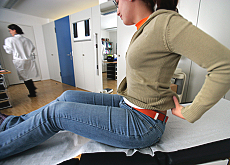From cradle to crave: men get hungry too

Pregnancy sympathy in male partners has a strong psychological and biological basis, according to Swiss researchers.
They say it is quite common for a man to share his pregnant partner’s mood swings, morning sickness or cravings for industrial amounts of chocolate fudge ice cream up to and after the birth of a child.
“On both sides, there is always a biological and psychological element,” Tiziana Perini, a psychotherapist and researcher at Zurich University, told swissinfo.
As part of a PhD dissertation Perini is conducting a study into the phenomenon of pregnancy sympathy with 37 couples.
Her work centres on male hormone levels and involves comparing samples from two groups – one without children and the other expecting for the first time.
Perini has noticed definite physical and behavioural distinctions between the two groups.
She says that 50 per cent of her subjects have reported experiencing mood swings. A smaller number have experienced fluctuations in weight and appetite as well. Raymond Oswald knows all about it.
“My chocolate consumption increased massively,” the new father told Swiss television.
Valuable insights
Johannes Bitzer, an obstetrician-gynaecologist at Basel University, recalls that he too was affected by his wife’s pregnancy. He said that his symptoms – including gastrointestinal upset – are what originally led him to become interested.
Bitzer – whose background in obstetrics is complemented with experience in psychotherapy and behavioural medicine – is now conducting clinical observations on his own patients.
He says that while the observations are not as rigorous as a systematic study, they are still valuable and have yielded interesting insights into the phenomenon.
Bitzer’s behavioural-based research has led him to question how a father can subconsciously take up the symptoms of the mother. He says that he would like to see whether this could be reproduced within a larger social group.
Hormonal changes
Another interesting question arising from pregnancy sympathy in men, according to Bitzer, is the relationship between the physical and emotional changes and a couple’s wellbeing.
“We do realise that pregnancy and the post-partum period are not only periods which are good for the couple and which bring them together, but which also put quite a bit of stress on them. This may lead to relationship difficulties and a situation in which both partners need care,” Bitzer told swissinfo.
For Perini, who has provided psychotherapy services within Zurich University hospital’s maternity ward, there has traditionally been a lopsided focus in counselling.
“Where are the fathers? The fathers are always out of this process. We have to look more at the fathers,” she said. “Hormonal changes make you feel more like a father and more motivated to care.”
Perini says the experiences of men are not only rooted in human evolution but are also reflected in nature. The less a species reproduces, the greater the incentive to ensure each offspring survives, she says.
Consequently, a shift from quantity to quality presents the paradox in modern lovemaking: less “making”, but more love. Birth rates here have been falling since the mid-1960s and experts say there is little hope for this increasing anytime soon.
swissinfo, Justin Häne
Recently, a team at St George’s hospital at the University of London released a study supporting Swiss research.
“Some people may perceive this as men trying to get in on the act, but far from being attention-seeking, these symptoms are involuntary,” said the study’s leader, Arthur Brennan. “Often the men haven’t got a clue about what’s happening to them.”
Brennan is not the first European to have picked up that something was awry with the partners of pregnant women. During the medieval ages, fathers in the Basque region – which today straddles the Spanish/French border – reported suffering from the same symptoms as some men today.
Men would seek bed rest and complain of labour pains leading up to and immediately after the birth of a child. Some were even reported to have suffered from pseudocyesis, a condition where the abdomen swells to mimic a pregnant stomach.
This is how the term “couvade” – derived from the French word, “couver” (to hatch) – came about.

In compliance with the JTI standards
More: SWI swissinfo.ch certified by the Journalism Trust Initiative



You can find an overview of ongoing debates with our journalists here. Please join us!
If you want to start a conversation about a topic raised in this article or want to report factual errors, email us at english@swissinfo.ch.